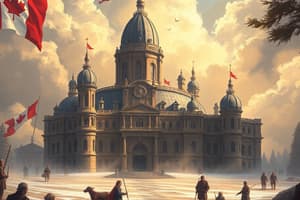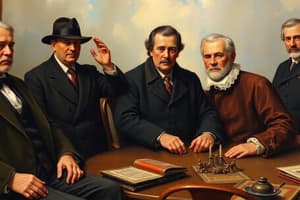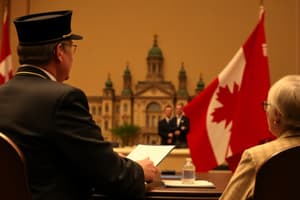Podcast
Questions and Answers
In which year did Canada adopt a new flag?
In which year did Canada adopt a new flag?
- 1970
- 1995
- 1982
- 1965 (correct)
Which event is associated with the year 1929?
Which event is associated with the year 1929?
- The Battle of Vimy Ridge
- The Treaty of Versailles is signed
- 'Black Tuesday': the Stock Market Crash (correct)
- The FLQ October Crisis
Which year did Pierre Elliot Trudeau become Prime Minister of Canada?
Which year did Pierre Elliot Trudeau become Prime Minister of Canada?
- 1968 (correct)
- 1965
- 1970
- 1982
Which of the following was a consequence of the War Measures Act being invoked in 1970?
Which of the following was a consequence of the War Measures Act being invoked in 1970?
What event took place in 1917 that involved Canadian soldiers?
What event took place in 1917 that involved Canadian soldiers?
Besides French Canadians and farmers, which other group was notably against conscription during the World Wars?
Besides French Canadians and farmers, which other group was notably against conscription during the World Wars?
In 1915, what specific challenge did Canadian soliders face during the battle at Ypres?
In 1915, what specific challenge did Canadian soliders face during the battle at Ypres?
Which of the following best describes why the 'On-to-Ottawa Trek' occurred?
Which of the following best describes why the 'On-to-Ottawa Trek' occurred?
What was the primary focus of the 1980 Quebec Referendum led by Premier Rene Levesque?
What was the primary focus of the 1980 Quebec Referendum led by Premier Rene Levesque?
Considering the study guide's instructions for the political cartoon analysis, what is the most important initial step?
Considering the study guide's instructions for the political cartoon analysis, what is the most important initial step?
What was the primary reason for Canada joining NORAD in 1957?
What was the primary reason for Canada joining NORAD in 1957?
What event is most directly linked to triggering the immediate outbreak of World War I?
What event is most directly linked to triggering the immediate outbreak of World War I?
According to the study guide, what is a critical component of a persuasive paragraph?
According to the study guide, what is a critical component of a persuasive paragraph?
According to the study guide, what should students use to verify answers and provide well-reasoned explanations?
According to the study guide, what should students use to verify answers and provide well-reasoned explanations?
Which of the following best describes René Lévesque's role in Canadian history?
Which of the following best describes René Lévesque's role in Canadian history?
Why did the German government view the Treaty of Versailles as a "diktat"?
Why did the German government view the Treaty of Versailles as a "diktat"?
Which of the following options is considered a topic for the political cartoon analysis?
Which of the following options is considered a topic for the political cartoon analysis?
What action did the Borden government take as a result of declining enlistment during WWI?
What action did the Borden government take as a result of declining enlistment during WWI?
What was the primary purpose of establishing residential schools for First Nations children in Canada?
What was the primary purpose of establishing residential schools for First Nations children in Canada?
What was the significance of the Second Battle of Ypres for Canadian troops?
What was the significance of the Second Battle of Ypres for Canadian troops?
What was the primary consequence of the Winnipeg General Strike?
What was the primary consequence of the Winnipeg General Strike?
During both World War I and World War II, what was a common role that women undertook on the homefront?
During both World War I and World War II, what was a common role that women undertook on the homefront?
The quote by Christian Bale's character in Swing Kids, 'We can hide here together. We can dance, and listen to music, and pretend the rest of the world doesn't exist,' reflects what?
The quote by Christian Bale's character in Swing Kids, 'We can hide here together. We can dance, and listen to music, and pretend the rest of the world doesn't exist,' reflects what?
What was the primary reason for Elijah Harper's opposition to the Meech Lake Accord?
What was the primary reason for Elijah Harper's opposition to the Meech Lake Accord?
James J. Braddock's quote, 'I have to believe that when things are bad, I can change them,' best symbolizes which historical context for Canadians?
James J. Braddock's quote, 'I have to believe that when things are bad, I can change them,' best symbolizes which historical context for Canadians?
What was the main outcome of Lord Sankey's ruling in 1929?
What was the main outcome of Lord Sankey's ruling in 1929?
Lester B. Pearson's quote, 'I believe that a national flag of the kind I have described in this resolution, that will be exclusively Canadian…' refers to what?
Lester B. Pearson's quote, 'I believe that a national flag of the kind I have described in this resolution, that will be exclusively Canadian…' refers to what?
What was the main idea behind Tommy Douglas's push for universal healthcare in Canada?
What was the main idea behind Tommy Douglas's push for universal healthcare in Canada?
Which event led Prime Minister Pierre Elliott Trudeau to invoke the War Measures Act in 1970?
Which event led Prime Minister Pierre Elliott Trudeau to invoke the War Measures Act in 1970?
Elijah Harper's quote, 'I was opposed to the Accord because we weren’t included in the Constitution…' refers to his opposition to which accord?
Elijah Harper's quote, 'I was opposed to the Accord because we weren’t included in the Constitution…' refers to his opposition to which accord?
What was one of the main functions of women volunteering during WW1 & WW2?
What was one of the main functions of women volunteering during WW1 & WW2?
What does Duncan Campbell Scott's 1921 quote, "I want to get rid of the Indian problem...", reflect about Canadian history?
What does Duncan Campbell Scott's 1921 quote, "I want to get rid of the Indian problem...", reflect about Canadian history?
What did Lester B.Pearson advocate for?
What did Lester B.Pearson advocate for?
What is the historical significance of Tommy Douglas in Canadian history?
What is the historical significance of Tommy Douglas in Canadian history?
What symbol did the Swing Kids embrace to fight the Nazi's in Nazi Germany?
What symbol did the Swing Kids embrace to fight the Nazi's in Nazi Germany?
What was the primary purpose of residential schools, as reflected in Duncan Campbell Scott's policies?
What was the primary purpose of residential schools, as reflected in Duncan Campbell Scott's policies?
What impact did the War Measures Act have on civil liberties in Canada during the October Crisis?
What impact did the War Measures Act have on civil liberties in Canada during the October Crisis?
Flashcards
Archduke Franz Ferdinand Assassination
Archduke Franz Ferdinand Assassination
The event where the Archduke of Austria, Franz Ferdinand, was assassinated in Sarajevo, Bosnia, on June 28th, 1914. This event, which set off a chain reaction of diplomatic alliances and obligations, is considered the catalyst for the beginning of World War I.
Battle of Vimy Ridge
Battle of Vimy Ridge
In 1917, during World War I, Canadian soldiers, known for their courage and relentless fighting spirit, made significant progress in capturing the strategically important ridge. It was a crucial victory for the Canadian Corps and a significant milestone in Canadian military history.
Canadian Flag Adoption
Canadian Flag Adoption
Canada's official national flag was adopted on February 15th, 1965. It features a single red maple leaf on a white field, symbolizing the country's unique identity, unity, and growth.
War Measures Act and FLQ Crisis
War Measures Act and FLQ Crisis
Signup and view all the flashcards
On-to-Ottawa Trek
On-to-Ottawa Trek
Signup and view all the flashcards
Quebec Referendum 1995
Quebec Referendum 1995
Signup and view all the flashcards
Halifax Explosion
Halifax Explosion
Signup and view all the flashcards
Treaty of Versailles
Treaty of Versailles
Signup and view all the flashcards
What event directly triggered WWI?
What event directly triggered WWI?
Signup and view all the flashcards
What was the controversial policy in Canada during both World Wars?
What was the controversial policy in Canada during both World Wars?
Signup and view all the flashcards
What political party emerged in Canada during the Great Depression?
What political party emerged in Canada during the Great Depression?
Signup and view all the flashcards
How did the Canadian government raise funds during WWI?
How did the Canadian government raise funds during WWI?
Signup and view all the flashcards
What did the Borden government introduce during WWI to address declining enlistment?
What did the Borden government introduce during WWI to address declining enlistment?
Signup and view all the flashcards
Why did the Germans consider the Treaty of Versailles a 'diktat'?
Why did the Germans consider the Treaty of Versailles a 'diktat'?
Signup and view all the flashcards
What was the purpose of residential schools in Canada?
What was the purpose of residential schools in Canada?
Signup and view all the flashcards
Why did Canada join NORAD?
Why did Canada join NORAD?
Signup and view all the flashcards
Homefront Volunteering in WWI & WWII
Homefront Volunteering in WWI & WWII
Signup and view all the flashcards
Swing Kids Movement
Swing Kids Movement
Signup and view all the flashcards
James J. Braddock's Quote
James J. Braddock's Quote
Signup and view all the flashcards
Great Flag Debate
Great Flag Debate
Signup and view all the flashcards
Elijah Harper's Opposition to Meech Lake Accord
Elijah Harper's Opposition to Meech Lake Accord
Signup and view all the flashcards
Duncan Campbell Scott's quote about the "Indian problem"
Duncan Campbell Scott's quote about the "Indian problem"
Signup and view all the flashcards
Lord Sankey's ruling on women as "persons"
Lord Sankey's ruling on women as "persons"
Signup and view all the flashcards
The October Crisis and War Measures Act
The October Crisis and War Measures Act
Signup and view all the flashcards
Tommy Douglas and the concept of universal healthcare
Tommy Douglas and the concept of universal healthcare
Signup and view all the flashcards
Elijah Harper and the Meech Lake Accord
Elijah Harper and the Meech Lake Accord
Signup and view all the flashcards
1980 Quebec Referendum
1980 Quebec Referendum
Signup and view all the flashcards
NAFTA/USMCA
NAFTA/USMCA
Signup and view all the flashcards
Attack on Pearl Harbor and Canada
Attack on Pearl Harbor and Canada
Signup and view all the flashcards
Terry Fox
Terry Fox
Signup and view all the flashcards
Canada's History: Freedom vs. Intolerance
Canada's History: Freedom vs. Intolerance
Signup and view all the flashcards
Study Notes
Sequence Matching Section
- Juno Beach invasion - 1944
- Black Tuesday: Stock Market Crash - 1929
- Battle of Vimy Ridge - 1917
- Treaty of Versailles signed - 1919
- Archduke Franz Ferdinand assassinated - 1914
- Charter of Rights and Freedoms introduced - 1982
- FLQ October Crisis - 1970
- Canada adopts new flag - 1965
- Quebec referendum - 1995
- Pierre Elliot Trudeau becomes Prime Minister - 1968
True or False Section
- To end war against Japan in August 1945, Americans used one atomic bomb - True
- René Lévesque was leader of Parti Québécois - True
- Adolf Hitler, Benito Mussolini, and Mackenzie King did not survive the war - False
- Pierre Elliot Trudeau was leader of the Liberal party - True
- Militarism was an underlying cause of WWII - True
- René Lévesque was leader of the separatist party, Parti Québécois - True
- The Avro Arrow Project was cancelled in 1959 - True
Additional Information
- Canada supplied natural resources (primarily uranium) for the Manhattan Project - True
- The second stage of the Holocaust was "segregation" - False
- Halifax explosion brought reality of war home to Canada during WWII - False
- In 1915, Canadian soldiers faced large-scale poisonous gas at Ypres - True
- French Canadians, farmers, and labour unions were against conscription - True
- The On-to-Ottawa Trek was not due to demands for better working conditions but rather government handling of unemployment and relief camps.
- Federal government invoked War Measures Act (October 16, 1970) due to FLQ kidnappings and bombings - True
- War Measures Act (October 16, 1970) was an emergency procedure to maintain order and security in Canada - True
- This country did not switch sides during WWI - No information provided in the text.
- This government policy (conscription) divided Canadians in WWI but less so in WWII - True
- Social Credit party linked to the Great Depression - True
- Assassination of Archduke Franz Ferdinand linked to the immediate outbreak of WWI - True
- War bonds were used by the Canadian government to raise funds during WWI - True
- Borden government introduced conscription due to declining enlistment in WWI - True
- Rene Levesque was a key figure in Quebec's independence movement - True
- Treaty of Versailles was criticized as a "diktat" due to lack of negotiation, harsh penalties, and war guilt - True
- Residential Schools for First Nations children established to assimilate Indigenous culture and bring in European culture - True
- Canada joined NORAD in 1957 due to Cold War and Soviet air attacks - True
- Diefenbaker cancelled Avro Arrow Project due to cost concerns, technical challenges, change in defense, and pressure from the US- True.
- "Phony War" describes a period with little fighting between Germany and Allies after the outbreak of WWII - True
- The King government introduced conscription to boost the number of soldiers in 1941 due to declining enlistment - True
- Canadian troops faced the first large-scale use of poison gas by the Germans at the Second Battle of Ypres in April 1915 - True
- Winnipeg general strike resulted in greater recognition of worker rights, though labour activism was subsequently put down - True
- Women served as nurses, factory workers, and in non-combat roles in the military (CWAC, etc.) during WWI and WWII, also on the homefront to support troops.
Studying That Suits You
Use AI to generate personalized quizzes and flashcards to suit your learning preferences.




